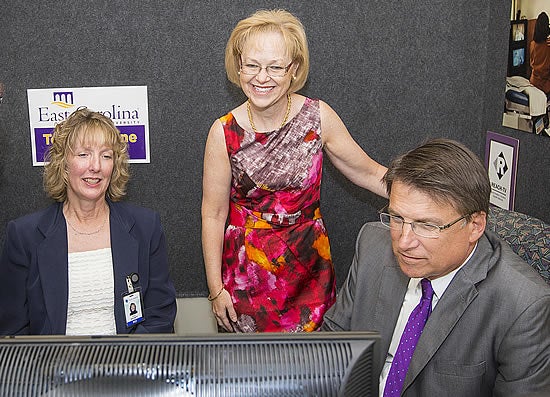Serving Statewide
Brody telepsychiatry network to expand across N.C.
GREENVILLE —Hospital mental health services across the state will get a boost thanks to the expansion of an East Carolina University program that delivers expertise through a telemedicine network.
Gov. Pat McCrory and N.C. Health and Human Services Secretary Dr. Aldona Wos joined ECU leaders in Greenville today to announce the expansion.
State appropriations of $4 million over the next two years will grow a program that has served 14 hospitals in eastern North Carolina to 60 to 80 hospital emergency departments across the state. The majority of North Carolina emergency departments do not have access to a full-time psychiatrist, according to a 2010 study.
“There are a lot of other things that get publicity, but the thing that keeps me awake at night is substance abuse and mental health,” McCrory said during the announcement at Ross Hall on the campus of ECU. “This is an issue we can’t run away from. We have to reach out and help them.”
The statewide telepsychiatry program will begin operating in January. It will link hospital emergency departments to mental health professionals who can initiate treatment for emergency department patients in mental health or substance abuse crisis.

Gloria Jones of the ECU Telemedicine Center; Dr. Kaye McGinty, an ECU psychiatrist; Dr. Aldona Wos, secretary of the N.C. Department of Health and Human Services; and Gov. Pat McCrory watch a demonstration of a telepsychiatry assessment.
By using secure, real-time interactive audio and video technology at the bedside, telepsychiatry will enable mental health providers to diagnose and treat people needing care at any remote referring site. The program will be overseen by the DHHS Office of Rural Health and Community Care.
Dr. Sy Saeed, chair of psychiatric medicine at the Brody School of Medicine at ECU, was out of town during the announcement but spoke earlier about the impact of the telepsychiatry program.
“There is no health without mental health,” Saeed said. “If you don’t have professionals in the area, you have a problem. (The program is) growing, and we serve a much larger number of patients with telepsychiatry than we were ever able to reach.”
The expansion builds on the success of ECU’s Center for Telepsychiatry and e-Behavioral Health and the Albemarle Hospital Foundation Telepsychiatry Project. The General Assembly’s Joint Legislative Oversight Committee on Health and Human Services recommended this project.
The system works like this: A nurse rolls a portable cart outfitted with a monitor, camera and microphone into the patient’s bay or room, establishes a secure link to the psychiatric provider site and introduces the patient to an “intake specialist” on the other end who’s already reviewed the patient’s information. This psychologist or social worker explores the patient’s situation and gathers more information from family members.
A psychiatrist then interviews the patient and makes a recommendation to the referring hospital physician, who is ultimately responsible for care decisions.
According to federal guidelines, 58 counties in North Carolina now qualify as Health Professional Shortage Areas due to a lack of mental health providers. Today, patients often receive less-than-optimum care or wait, sometimes several days or more, because of the lack of mental health practitioners, McCrory said.
Mental health patients have also been a growing burden for the state’s emergency departments. Making up 9.3 percent of E.D. visits, the number of people with a mental health problem as a leading diagnosis is nearly double the national average, according to researchers at UNC Hospitals in Chapel Hill. The figures don’t include substance abuse.
To expand the program, ECU will develop a provider network and set technology infrastructure and guidelines for administering the program. An advisory group will work with the Statewide Telepsychiatry Program to promote collaboration among partners.
“This project is about providing evidence-based mental health care to our patients regardless of where they may be located in North Carolina,” said Saeed. “As we do that, we are beginning to bridge the gap between science and practice that exists today in all areas of medicine.”
ECU’s telemedicine program has been in continuous operation since its inception in 1992, making it one of the longest running clinical telemedicine operations in the world.
Since the Albemarle Hospital Foundation telepsychiatry program began in 2011, more than 4,000 psychiatric assessments have been provided to patients in emergency departments experiencing a mental health crisis. Initial project outcomes include reduction in patients’ lengths of stay, reductions in 30-day recidivism rates and reductions in involuntary commitments to inpatient psychiatric facilities. Specifically, lengths of stay for patients discharged to inpatient treatment have dropped from an average of 48 hours pre-telepsychiatry to 22.5 hours since the program began.
That program is funded by a three-year, $1.6 million grant from The Duke Endowment and managed by the Albemarle Hospital Foundation in partnership with Vidant Health and the Brody School of Medicine.